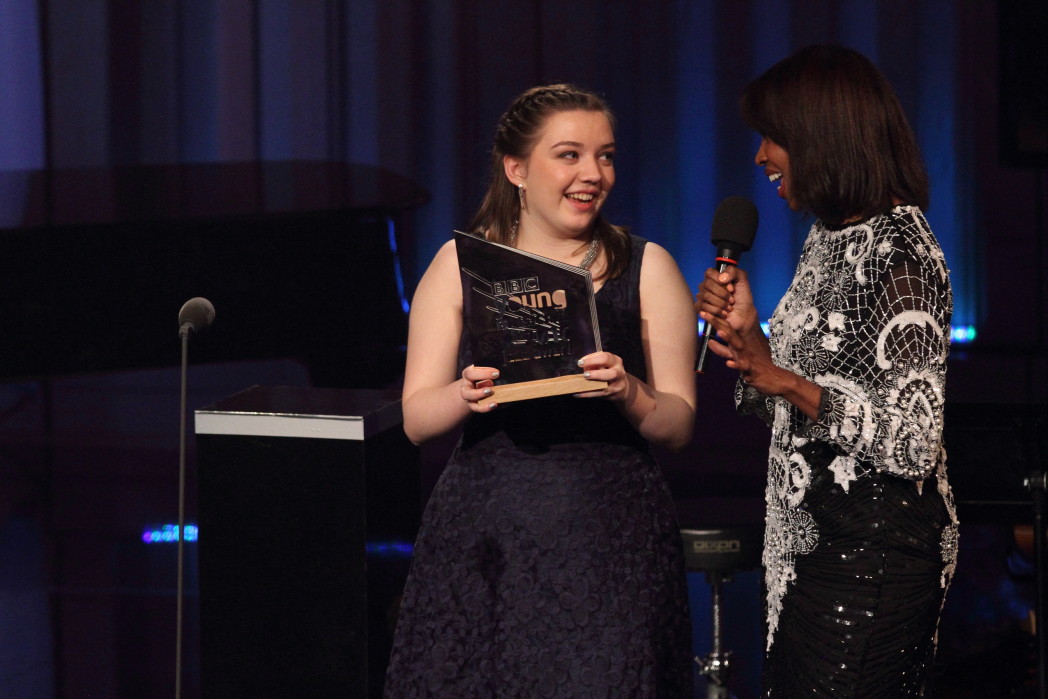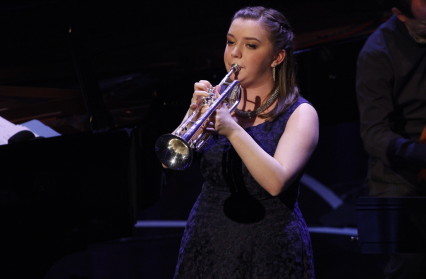Dora Stoutzker Hall, Royal Welsh College of Music and Drama, Cardiff, March 12 2016
Jazz broadcasting at the BBC has always been controversial. There’s either too much of it or not enough. It’s on too late or too early. When you get used to one programme at a certain time, it’s switched to some other, usually inconvenient, hour. Also, the BBC is a tight Establishment organisation, whereas jazz is twilit, subversive, and ultra-relaxed, at least in the way it operates. When you turn up for a jazz gig at 8pm, a sixteen-minute wait is not uncommon, but when it’s announced that a radio or TV programme is starting at 9pm on the pip you know it’ll have been running for a quarter of an hour if you decide to tune in at 9.15pm. Jazz and the BBC: they weren’t made for each other, were they?
The BBC is still taking it on the chin from some quarters for now including jazz in its long-running BBC Young Musician contest. It’s only doing it, the argument goes, because jazz as a discipline to be learned has been taken up by the academies, a guarantee of well-behaved, neatly-attired sterility; like ‘Aunty’, it’s become respectable. The first biennial BBC Young Jazz Musician winner in 2014, saxophonist Alexander Bone, from Darlington, is now ‘studying’ jazz at the Royal Academy of Music. But if it’s any consolation, the embattled positions and the facetious sniping are peculiarly British phenomena. No-one ever said a bad word about the Berklee School of Music in Boston or the Brubeck Institute in California. But they do things differently over the water, where jazz began. Perhaps the BBC competition has pianist Gwilym Simcock and his trio as mentors to the finalists because he and they have academic credentials. Safe hands, as it were. Who knows? One thing’s for sure: when you’re arguing and moaning, you ain’t listening to the music.
Yet, in this otherwise negative spirit of disputation, one has to say that the high point of the finals this year was Bone’s add-on appearance with the Simcock trio while the judges were deliberating over the five contestants. Still the engaging musician he was two years ago, he also showed in the pair of items he played that he’d lost none of his authority and presence, despite a faltering start to his gizmo-assisted original, Cardiff, in which the loops stubbormly refused to loop. His rapport with the audience was still the same and the relative lack of it in this year’s finalists took something away from their chances of winning. But, hey, the road is still long and winding.

The choice of teenage trumpeter Alexandra Ridout from Aylesbury as the 2016 winner, however, raised the idea of the musical competition as lottery. Almost anyone could have won this year and, as chairman of judges Julian Joseph remarked, there were many factors to be considered, not least the age of competitors. At 17, Ridout was the youngest bar one, and the ratio of age to competence had just about levelled out in her favour after she’d coasted through her final number, Stevie Wonder’s Golden Lady, on flugelhorn. It was perhaps the best demonstration on the night of how Simcock’s trio (with bassist Yuri Goloubev and drummer James Maddren) never played down to the soloists; conversely, their enrichment sometimes made the contestants sound better than they may eventually turn out to be. Ridout’s almost speechless elation on being declared the winner must have been the opposite of 20-year-old London saxophonist Tom Smith’s disappointment. A finalist who tried too hard in 2014, he turned up again, which said something about his abilities and determination. He’d changed the tone of his programme from two years before, the crowd-pleasing drive of Jerome Richardson’s The Groove Merchant prefacing his own rather dark but probing works played on alto, which may have seen the winning post drift out of reach. That’s gladiatorial competition for you, when noisy audience response has a bearing.
All five are studying jazz at the highest academic levels and included a composition of their own, not least 21-year-old Birmingham Conservatoire pianist Elliott Sansom, from Solihull, whose opening Prelude seemed to suggest commendable jazz-related depths and elsewhere a style on verge of opening out. The youngest finalist and second pianist, 15-year-old Noah Stoneman, another Londoner, showed much indebtedness to Bill Evans and loped abroad on Edward Reddings’s The End Of A Love Affair by switching to Nord electric organ, probably a well-intentioned mistake. Elsewhere, his concentration on the centre of the piano keyboard reflected a technical diffidence that came across as lack of invention. But, still, early days. Which leaves the winner’s 21-year-old brother, saxophonist Tom Ridout, who was first up and drew closest to Alexander Bone’s procedure of winning over the crowd, especially on tenor by whipping the tempo of a Wayne Shorter/Victor Young ballad segue into a stretto-like pulse-racer. Entertainingly, he switched to electro-enhanced recorder for his own composition, Chain. We’ll be seeing more of him – and his sister.
The jury of Tim Garland, Zoe Rahman, Byron Wallen, Gwyneth Herbert and Joseph took a while to deliberate, suggesting that the final decision was neither cut nor dried. The final will be televised by the BBC on May 13 2016.
Header photo: Alexandra Ridout, winner © Brian Tarr



 Enjoyed this article? Support our writers directly by buying them a coffee and clicking this link.
Enjoyed this article? Support our writers directly by buying them a coffee and clicking this link.







